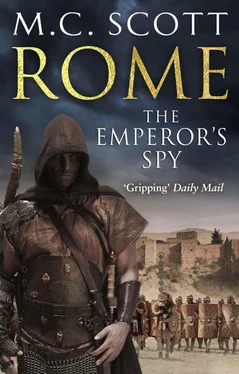M. Scott - Rome - The Emperor's spy
Здесь есть возможность читать онлайн «M. Scott - Rome - The Emperor's spy» весь текст электронной книги совершенно бесплатно (целиком полную версию без сокращений). В некоторых случаях можно слушать аудио, скачать через торрент в формате fb2 и присутствует краткое содержание. Жанр: Исторические приключения, на английском языке. Описание произведения, (предисловие) а так же отзывы посетителей доступны на портале библиотеки ЛибКат.
- Название:Rome: The Emperor's spy
- Автор:
- Жанр:
- Год:неизвестен
- ISBN:нет данных
- Рейтинг книги:3 / 5. Голосов: 1
-
Избранное:Добавить в избранное
- Отзывы:
-
Ваша оценка:
- 60
- 1
- 2
- 3
- 4
- 5
Rome: The Emperor's spy: краткое содержание, описание и аннотация
Предлагаем к чтению аннотацию, описание, краткое содержание или предисловие (зависит от того, что написал сам автор книги «Rome: The Emperor's spy»). Если вы не нашли необходимую информацию о книге — напишите в комментариях, мы постараемся отыскать её.
Rome: The Emperor's spy — читать онлайн бесплатно полную книгу (весь текст) целиком
Ниже представлен текст книги, разбитый по страницам. Система сохранения места последней прочитанной страницы, позволяет с удобством читать онлайн бесплатно книгу «Rome: The Emperor's spy», без необходимости каждый раз заново искать на чём Вы остановились. Поставьте закладку, и сможете в любой момент перейти на страницу, на которой закончили чтение.
Интервал:
Закладка:
M. C. Scott
Rome: The Emperor's Spy
Prologue
Jerusalem in the Reign of the Emperor Tiberius
Sebastos Abdes Pantera was twelve years old and nearly a man on the night he discovered that his father was a traitor.
It was spring, the bright time of flowers, and Passover, the time of celebration, sacrifice and riots. Every year, teams of priests worked without cease from sunrise to sunset, cutting the throats of countless thousands of lambs in the temple.
Every year, the multitudes of the faithful gathered to eat those lambs in memory of the angel of death who passed over their houses, striking down the firstborn of Egypt.
Every year, the Roman prefect cancelled all leave amongst his legions and set guards about the hot, dry city, packed to capacity with the hot, dry pride of a conquered people.
Through the nights of unleavened bread, conquerors and conquered waited alike for a spark bright enough to light the ultimate, uncontainable riot that would see the legions let loose and the streets run rivers of blood. It had not happened yet.
In a private garden beyond the city gates, the sounds of celebration were the muffled roar of a storm not yet broken. The air was heavy with the scent of almond blossom, lilies, crushed camphire and blood. A hot wind rent the trees, raining petals to the earth. It did not move the sullen clouds that marred the sky.
Crouching alone in the dark beneath the nut trees, Sebastos heard the approach and retreat of a watch-guard’s feet. He shut out all other noises, and made himself listen only to the soft clash of leather and metal on the path.
Before the second circuit, he knew that the nails of the guard’s right sandal had worn thin on the inside heel, and knew thereby that it was his father, best of all men, who strode alone in the leaden dark.
Julius Tiberius Abdes Pantera, decurion of the first wing of the first company of archers stationed in Judaea under the direct command of the prefect, may have got his son as a bastard on a Gaulish slave-woman, but none the less, Sebastos knew himself to be the child of a true soldier.
Since the day he could first walk, his father had taught him the secrets of the archer’s craft and had instilled with it, as the food and drink of his son’s young life, the twin bedrocks by which a soldier measured his own worth.
First of these was his absolute loyalty to his commander: a true legionary obeyed every order immediately and without question. Second, stemming from the first, was the unblemished virtue of his own honour which required that he always bring respect and dignity to his position.
Honour was everything. Sebastos lived to seem honourable in his father’s eyes and by now he knew how to do that. As he had been taught, he made himself explore his surroundings with his fingertips, discovering by touch the nature and size of any obstacles that might hinder or help his progress. In doing so, he kept his mind well away from the terrifying cloud above his head. All night, it had smothered the moon and stars and seemed likely at any moment to fall and smother him.
He had mentioned the cloud to his father in the afternoon, before the summons came to guard the tomb. In day’s safe light, his father had ruffled his hair and laughed and said that only a true Gaul feared the sky would fall on his head.
There had been a tremor in his voice and Sebastos had hoped that it grew from pride that the only son of an Alexandrian archer should take so truly after the barbarian tribes of his mother’s people, rather than from shame for that same thing.
Later, lying alone in the dark, yearning for the cloud to leave, Sebastos had realized that it had nothing to do with pride, and everything to do with grief — that his father still mourned his mother and Sebastos hadn’t thought to comfort him.
What kind of boy forgets the source of his father’s pain? Shame at his own stupidity had goaded him from his bed and up the hill, skirting the walls of the city to reach the gated garden on the slope with its many scented flowers and the trail of blood leading up to the tomb. Here, where his father marched alone, he had a chance to undo his mistake.
A thistle grew sharp behind Sebastos’ left foot. An ageing pomegranate guarded his right shoulder. To his left, a bed of kitchen herbs spiced the hot air. Beyond that, the path curved snake-like up the hill. Clouds loomed over, threateningly full.
His father reached the first row of almonds. The sound of his tread paused a moment, before beginning the march back up the slope. The watch-fire’s red glow caught him as he turned, casting his outline in proud silhouette.
Sebastos grinned. A fierce joy lifted the threat of the falling sky. Swift as the great spotted cat for which he was named, he slid out from under the almonds and ran through the dark towards his father.
‘Pantera?’
Sebastos cannoned to a halt, balanced on one foot. The call came from his left, down the path, less than a bow’s shot away. The voice was a woman’s, like his mother’s, but lacking her Gaulish accent.
Sebastos’ left hand found a wall of cool rock to lean on. He stood in the darkest of the dark and held his breath. His father, too, had stopped, but — unaccountably — did not challenge the incomer. Instead, he raised his fingers to his lips and gave a short, low whistle.
No answering call came back. Instead, from lower down the path, a whispering flame danced closer, and stronger, until it lit the woman and two men who brought it.
‘Julius. Thank you.’
The woman who stepped forward was his mother’s age, but under the kind blaze of the torch her face was smooth, her cheeks were clear, and her eyes were bright. Sebastos thought she had been weeping, and was close to it again.
His father was not weeping. His face had softened in a way the boy had not seen in six months.
‘Mariamne.’
Stepping into the puddle of light, Pantera spoke the tenderest, dearest form of the name, which a man might use only for his wife, or his daughter, or his sister. He raised a hand as if to touch the woman’s face and then dropped it again, his eyes wide with unspoken care.
The man holding the torch moved forward. Its light spilled out beyond the confines of the woman’s face and Sebastos saw that she was pregnant. The signs were not obvious yet; she was no more than three months gone. Only a boy trained from infancy to study every detail of those about him would have seen it.
His father knew, that much was clear. He had stepped back, making a sign that she should precede him up the path.
She hesitated, as if afraid to move on. ‘Is he still alive?’ Her voice was rich and light as a temple chime. The torch set the almond blossom dancing. Moths cast giant, floating shadows into the night.
His father bowed, as he might have done to his commander in the barracks. ‘My lady, he was when we brought him here.’
‘You have water and linen?’
‘Everything you asked for is here.’
‘Lead us, then,’ said the woman, and Sebastos pressed himself deeper into the dark and watched as his father abandoned twenty years of obedience to his commander and to Rome, and led a woman of the Hebrews and her two companions up the garden to the tomb he was supposed to be guarding.
Men were crucified for less. A dozen had been, through the long day. The body of one of them lay in a tomb cut into the rock at the garden’s end.
In a line, the incomers passed Sebastos, so that he saw them, one after the other. The two men walking behind the woman were as different one from the other as lily from desert thorn. The elder was a grey-haired rabbi, marked by the quality and style of his linen robes. He bore himself with an authority that was undercut by fear. He, at least, knew exactly what he risked.
Читать дальшеИнтервал:
Закладка:
Похожие книги на «Rome: The Emperor's spy»
Представляем Вашему вниманию похожие книги на «Rome: The Emperor's spy» списком для выбора. Мы отобрали схожую по названию и смыслу литературу в надежде предоставить читателям больше вариантов отыскать новые, интересные, ещё непрочитанные произведения.
Обсуждение, отзывы о книге «Rome: The Emperor's spy» и просто собственные мнения читателей. Оставьте ваши комментарии, напишите, что Вы думаете о произведении, его смысле или главных героях. Укажите что конкретно понравилось, а что нет, и почему Вы так считаете.












